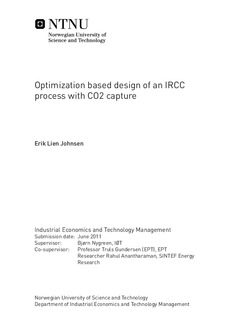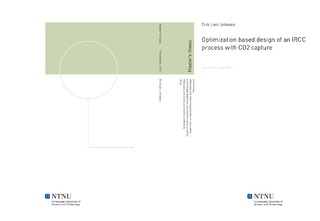| dc.contributor.advisor | Nygreen, Bjørn | nb_NO |
| dc.contributor.advisor | Gundersen (EPT), Professor Truls | nb_NO |
| dc.contributor.advisor | Anantharaman, Researcher Rahul | nb_NO |
| dc.contributor.author | Johnsen, Erik Lien | nb_NO |
| dc.date.accessioned | 2014-12-19T14:27:46Z | |
| dc.date.available | 2014-12-19T14:27:46Z | |
| dc.date.created | 2012-01-06 | nb_NO |
| dc.date.issued | 2011 | nb_NO |
| dc.identifier | 473586 | nb_NO |
| dc.identifier | ntnudaim:6113 | nb_NO |
| dc.identifier.uri | http://hdl.handle.net/11250/265954 | |
| dc.description.abstract | To deal with the threat of climate change, many technologies should be investigated, and power generation through an IRCC with CO2 capture is one alternative. However, capturing CO2 has a negative effect on the efficiency of the process as it requires a lot of energy. In this work, we try to reduce the energy consumption of an IRCC process with CO2 capture by developing a tool for finding the optimal process design with extensive heat integration.The design of an IRCC process involves many parameters which interfere in complex relationships. In this report, an MINLP model is established for optimizing important parameters simultaneously. The model relies on metamodeling based on process simulations in Aspen HYSYS to approximate difficult correlations, combined with a more direct approach for modeling computationally easier parts of the process.A general model for heat recovery targeting is developed for the heat integration optimization, and implemented as a part of the full IRCC optimization model.The global solver BARON is used for solving the problem, together with a relaxation procedure based on pinch analysis insights, and optimal solutions are usually found within several hours.The optimized IRCC process reaches a net electric efficiency of 49.97 %, assuming maximum heat integration, with only 1 % of the cooling and heating demands to be covered by utilities. The accuracy of the model is relatively good when compared to process simulations, but a less idealistic version of the IRCC should be designed based on the results to confirm the capability of the model. | nb_NO |
| dc.language | eng | nb_NO |
| dc.publisher | Institutt for industriell økonomi og teknologiledelse | nb_NO |
| dc.subject | ntnudaim:6113 | no_NO |
| dc.subject | MTIØT Industriell økonomi og teknologiledelse | no_NO |
| dc.subject | | no_NO |
| dc.title | Optimization based design of an IRCC process with CO2 capture | nb_NO |
| dc.type | Master thesis | nb_NO |
| dc.source.pagenumber | 162 | nb_NO |
| dc.contributor.department | Norges teknisk-naturvitenskapelige universitet, Fakultet for samfunnsvitenskap og teknologiledelse, Institutt for industriell økonomi og teknologiledelse | nb_NO |

